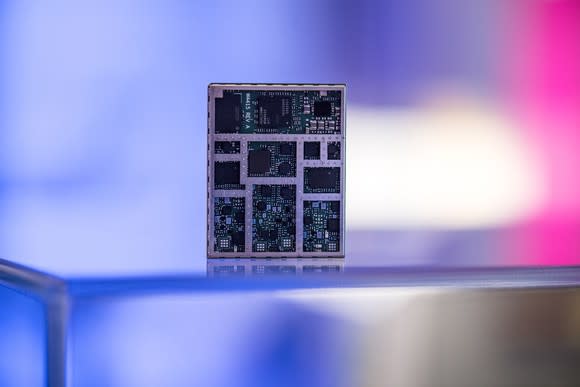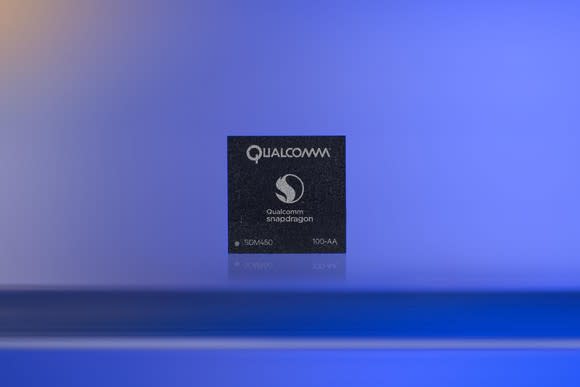Why Qualcomm, Inc. Isn't Building 7-Nanometer Chips
In a recent report, DIGITIMES said that mobile chip giant Qualcomm (NASDAQ: QCOM) adopted Samsung's (NASDAQOTH: SSNLF) 10-nanometer LPP manufacturing technology to build its recently announced Snapdragon 845 applications processor for premium smartphones instead of a 7-nanometer manufacturing technology.
As a rule of thumb, manufacturing technologies designated by smaller numbers tend to be denser and more efficient than ones designated by larger ones.

Image source: Qualcomm.
DigiTimes also cites some "industry watchers" who reportedly said that Qualcomm's decision to stick with Samsung's 10-nanometer tech for the Snapdragon 845 instead of going for Taiwan Semiconductor Manufacturing Company's (NYSE: TSM) 7-nanometer technology "is probably associated with strong retention efforts by Samsung and limited benefits from TSMC's existing [7-nanometer] technology."
That's all well and good, but there's another, arguably better, reason why Qualcomm decided to build the Snapdragon 845 on Samsung's 10-nanometer LPP technology instead of TSMC's 7-nanometer technology: TSMC's 7-nanometer technology isn't in mass production yet.
Can't build chips on a non-existent technology
TSMC went into mass production on its own 10-nanometer technology earlier this year. Qualcomm didn't adopt it -- it seems to be relying on Samsung exclusively for its advanced chip manufacturing needs -- but Apple (NASDAQ: AAPL) uses it exclusively to build its A10X processors for the iPad Pro and the A11 Bionic for the iPhone 8-series and iPhone X.
The company has said that it intends to begin producing chips using its 7-nanometer technology, which promises performance, power consumption, and area improvements compared to its 10-nanometer technology, sometime in 2018.
Considering that Qualcomm's Snapdragon 845 needs to be in mass production at this very moment to support the launches of Snapdragon 845-powered flagship smartphones in the first-half of 2018, I don't think TSMC's 7-nanometer technology would've been ready in time.

Image source: Qualcomm.
TSMC says it began what it calls "risk production" on its 7-nanometer technology in April 2017. It usually takes TSMC about a year to go from risk production to production shipments, so realistically, chips built using TSMC's 7-nanometer technology won't begin shipping until around April 2018. That's too late to support the launch of the Snapdragon 845, which is expected to power Samsung's Galaxy S9-series smartphones that are due to launch in March 2018.
Moreover, since smartphone chip product cycles tend to be a year long (since flagship smartphone product cycles are a year long), Qualcomm's next chance to migrate to TSMC's 7-nanometer technology -- that is, if it were to opt to use it -- would be for a product that'll ship by the end of 2018 for early 2019 device availability.
Will Qualcomm use TSMC's 7-nanometer tech?
If the rumors that Qualcomm plans to shift the production of its premium Snapdragon processors to TSMC from Samsung are true, then I'd expect to see a Snapdragon 855 built using TSMC's 7-nanometer technology announced by the end of 2018 for device availability in early 2019.
However, if those rumors aren't true and Qualcomm's relationship with Samsung Foundry remains tight, then I'd expect Qualcomm to not use TSMC's 7-nanometer technology or even a Samsung 7-nanometer technology. Instead, I'd expect the next-generation premium Snapdragon chip to be manufactured using Samsung's recently announced 8-nanometer technology.
Per Samsung, its 8-nanometer technology should offer as much as a 10% reduction in power consumption (presumably for the same performance) and as much as a 10% reduction in chip area compared to its currently in-production 10-nanometer technologies. In fact, a Qualcomm executive was even quoted in Samsung's press release announcing the qualification of Samsung's 8-nanometer technology.
So, while I do expect Qualcomm to migrate its highest-end chips to some technology called "7-nanometer" at some point, it probably won't be until early 2020. That, however, won't be due to Qualcomm's lack of interest in newer manufacturing technologies, but instead due to Samsung's technology plans and Qualcomm's seemingly tight relationship with Samsung's chip manufacturing division.
More From The Motley Fool
6 Years Later, 6 Charts That Show How Far Apple, Inc. Has Come Since Steve Jobs' Passing
Why You're Smart to Buy Shopify Inc. (US) -- Despite Citron's Report
Ashraf Eassa owns shares of Qualcomm. The Motley Fool owns shares of and recommends Apple. The Motley Fool owns shares of Qualcomm and has the following options: long January 2020 $150 calls on Apple and short January 2020 $155 calls on Apple. The Motley Fool has a disclosure policy.

 Yahoo Finance
Yahoo Finance 